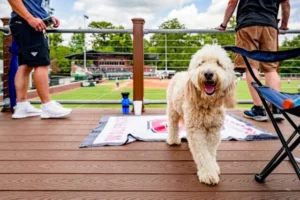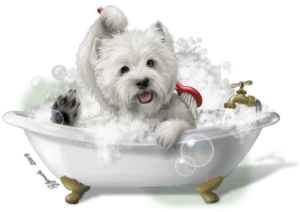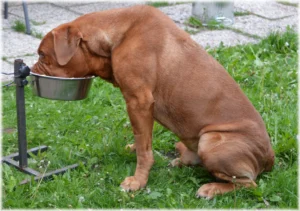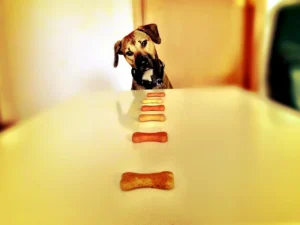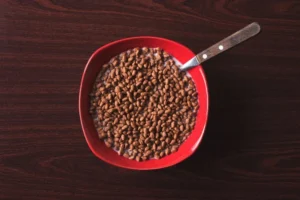Why Dogs Poop on the Floor?

Why Dogs Poop on the Floor?:- One of the proudest moments of being a dog parent is the joy that comes with successfully potty-training your puppy. However, as your dog gets older, occasional accidents can still happen. But what if your dog starts pooping in the house more frequently?
This is definitely unusual for a house-trained dog. Let’s explore some of the most common reasons behind this behaviour and what you can do to address it.

Why Your Dog Might Be Pooping Indoors: 7 Possible Causes
Why Dogs Poop on the Floor?:- If your dog is pooping inside the house, there could be a variety of reasons behind this behavior. Let’s explore nine common causes:
1. Intestinal Parasites
Parasites can disrupt a dog’s ability to control their bowels. For example, Giardia is a parasitic infection that often leads to sudden diarrhea, abdominal pain, and watery stools. These symptoms may cause your dog to have accidents indoors before they can make it outside.
2. Separation Anxiety
When dogs experience separation anxiety, they often become highly stressed when left alone. This anxiety can lead to indoor accidents, as well as behaviors like barking, whining, and destroying household items. The intense stress may overwhelm them, resulting in pooping indoors.
3. Fear of Outdoor Noises
Loud noises like thunder or fireworks can terrify dogs. In response, they might refuse to go outside, associating the noise with the outdoors. This fear can lead them to have accidents inside the house as they avoid the outdoors during stressful events.
4. Left Alone for Too Long
If dogs are left inside for extended periods, they may have accidents because they need to poop. While the frequency of pooping varies based on the type and quantity of food, most dogs will need to go one to two times a day. Dogs on a high-fiber diet may need to poop as often as three times daily.
5. Food Allergies
Food allergies can trigger various symptoms in dogs, such as gas and diarrhea. If your dog experiences sudden diarrhea, they might not make it outside in time, resulting in an indoor accident.
6. Inflammatory Bowel Disease (IBD)
Your dog could have a medical condition like inflammatory bowel disease (IBD), which causes symptoms such as vomiting, diarrhea, and loss of bowel control. If you suspect IBD, consult a vet for testing and possible treatments like probiotics, special diets, or medications.
7. Age-Related Concerns
As dogs age, they may face issues that increase the likelihood of accidents indoors. Older dogs often experience weakened muscles or nerve damage in the spinal cord, which can lead to incontinence and difficulty controlling bowel movements.

An older dog frequently pooping or peeing inside the house might be showing signs of senior dog dementia. As dogs age, they can become more confused, have hearing difficulties, and even wander around the house at odd hours. This confusion can lead to accidents inside the home.
How to Prevent Your Dog from Pooping in the House:
1. Identify the Cause: The first step is to determine the underlying issue. A visit to the vet can help rule out age-related conditions or medical issues. If these are the causes, your vet can suggest appropriate treatments or medications.
2. Stick to a Schedule: Consistency is key. Establish and maintain a regular schedule for bathroom breaks to help your dog learn when and where it’s appropriate to go. Remember, routines are especially important for older dogs.
3. Increase Potty Breaks: Make sure your dog has plenty of opportunities to go outside. More frequent bathroom breaks, whether through yard time or longer walks, will reinforce the idea that outdoor is the place to go.
4. Create a Safe Space: Designate a quiet, comfortable outdoor area where your dog can relieve itself without stress. If your dog follows you into the bathroom, it might be due to their natural instinct and pack mentality. Ensuring a calm environment can help alleviate their anxiety.
So after knowing Why Dogs Poop on the Floor? Clean up messes promptly to prevent future accidents. Use a high-quality enzyme cleaner to thoroughly remove dog poop and any stains. As Bonk points out, “Lingering odor acts like a magnet, enticing your dog to poop in the same spot again.” Even if you don’t detect a smell, your dog might still sense it. An enzyme cleaner neutralizes odors rather than just masking them, making it less likely your pet will return to the same spot. Consider investing in a designated dog poop trash can for convenience.
If necessary, Bonk recommends using a pee pad or indoor artificial turf pad in areas where your dog frequently poops. Once your dog becomes accustomed to using these pads, you can gradually move them closer to the door. Consistently encourage your dog to go outside, and over time, they will learn that the outdoors is the preferred place for bathroom needs. For additional tips on preventing indoor accidents, see the following suggestions.
What to Do if Your Senior Dog is Pooping in the House
Why Dogs Poop on the Floor?:- If your senior dog starts pooping in the house, it’s crucial to address the issue promptly to ensure their comfort and health. Here’s how you can handle the situation:
1. Consult Your Vet: Your first step should be to discuss the issue with your veterinarian. They may need to perform an examination and run diagnostics, including a fecal test, to determine the cause.
2. Evaluate Diet and Health: Your vet might suggest dietary changes or other treatments based on their findings. They will also check for any underlying health conditions that could be contributing to the problem.

3. Consider Age-Related Changes: Sometimes, age-related changes in your dog’s body can lead to accidents in the house. If diseases and diet have been ruled out, age might be a factor.
4. Avoid Punishment: It’s important not to punish your older, house-trained dog for these accidents. There’s often an underlying reason for the behavior. Instead, focus on finding practical solutions and making adjustments to help your dog.
By following these steps, you can better understand your senior dog’s needs and help them stay comfortable and healthy.
Here are some tips to manage your senior dog’s indoor accidents:
– Increase Bathroom Breaks: Let them outside more frequently to give them more opportunities to relieve themselves.
– Use Pee Pads: Place pee pads near their favorite spots or the doors they like to use. I’ve found these pee pads particularly effective for homes with senior dogs.
– Protect Your Home: Block off access to nice furniture or roll up carpets. Try replacing them with yoga mats to prevent slipping while keeping carpets out of reach.
– Consider Probiotics: If your vet approves, a probiotic might help. This is one that I recommend for my patients.
Remember, never punish your dog for pooping inside. House-trained dogs don’t intentionally defecate indoors; they want to go outside. If your senior dog is having accidents, it could be due to underlying health issues. Punishment can exacerbate the problem and make your dog anxious.
Also Read:-
